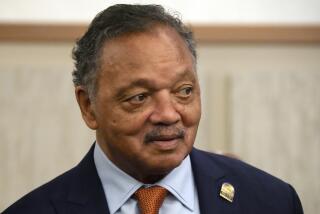NAACP Seeks New Leader, New Strategy : Civil rights: With resignation of Benjamin Hooks, officials are likely to pick someone who will focus on economic issues, attract younger members.
- Share via
WASHINGTON — With Benjamin L. Hooks’ decision to step down as head of the NAACP, the nation’s oldest civil rights organization begins the search for a new leader and a new strategy for its future.
The 64-member board of directors is likely to seek someone who can revitalize the organization, which has lost favor among younger, more business-minded black men and women, NAACP observers and officials say.
In recent years, the 500,000-member National Assn. for the Advancement of Colored People has failed to attract new members to keep pace with the rapid population growth of black Americans.
Although there is no early favorite, the next executive director is expected to be someone who will focus on economic programs for black Americans, rather than on lobbying elected officials and the federal courts to change social policies--the primary tactic of the NAACP throughout its history.
As one NAACP official put it, “The next Ben Hooks won’t be a Baptist preacher with traditional civil rights credentials.”
While a search committee has yet to be formed, several prominent blacks--Spellman College President Johnnetta Cole, former Charlotte (N.C.) Mayor Harvey Gantt, former U.S. Army Secretary Clifford L. Alexander Jr. and U.S. Civil Rights Commission member Mary Francis Berry--have been mentioned by NAACP officials as likely candidates to assume the top post when Hooks leaves next year.
The 67-year-old Hooks, who has been executive director for 15 years, announced his intentions at the organization’s annual meeting in New York last weekend and made them public at a news conference Wednesday.
For more than a year, many NAACP insiders speculated that Hooks would resign or be forced out at the end of his contract.
Some even feared a repeat of the heated debates that nearly destroyed the NAACP in 1976, when the widely admired Roy Wilkins was forced to step down as executive director at age 74 after it became apparent he was too old to lead the organization.
Hooks, then the first black man on the Federal Communications Commission and a former federal judge with long civil rights credentials, succeeded Wilkins in 1977.
In recent years, many NAACP members have grown restless under Hooks’ leadership, concerned that his down-home preacher style appealed primarily to elderly members. Many young blacks have shied away from the NAACP, complaining its elderly leaders dismissed ideas that they had to breathe new life into the group.
At the NAACP meeting last weekend, during which Hooks informed board members he would step aside when his contract expires on April 1, 1993, the internal fighting became public.
In a contentious session, Hazel Dukes was ousted as NAACP president, although she remains a member of the board; and board members Julian Bond and Herbert H. Henderson were removed from their posts. A fourth official, board member Percy E. Sutton, resigned.
Bond, an ex-Georgia state senator and longtime NAACP activist, and Henderson, a West Virginia lawyer and board member since 1980, lost their posts over support of a failed attempt to impose term limitations on board members.
Sutton, a New York lawyer and prominent NAACP fund-raiser, resigned his seat in solidarity with Dukes, sources said.
Hooks, who discussed his retirement Wednesday, said the board had offered to extend his contract for two years and that the political infighting had nothing to do with his decision.
Hooks said he chose to step down to “write, lecture, teach, work with my church and perhaps go back into the practice of law, if I can do so,” he said. “I have no intention of being idle and you have not heard the last of Ben Hooks.”
Nevertheless, when Hooks leaves the NAACP, the organization will, in the words of board chairman William F. Gibson, “embark on a new path.”
Writing in a recent issue of the Crisis, the NAACP’s membership magazine, Gibson promised the organization would never back away from social concerns, but he stressed the NAACP “must turn our attention to the pressing social and economic problems facing African-Americans.”
More to Read
Sign up for Essential California
The most important California stories and recommendations in your inbox every morning.
You may occasionally receive promotional content from the Los Angeles Times.












